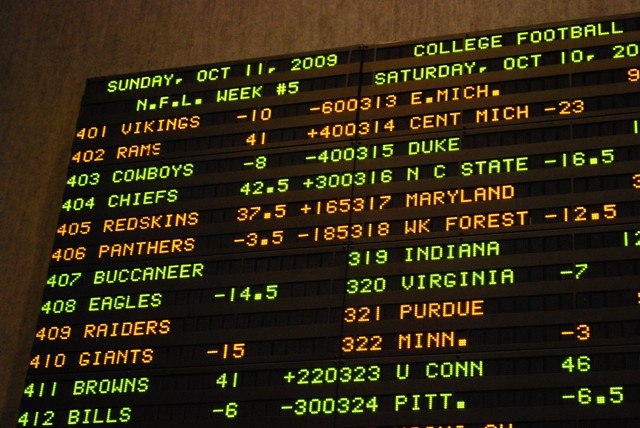
You bet too much on each game! How can I say such a thing without you even knowing? Just because I play "odds" probably 99% of players who bet on sports betting too. You think I'm wrong? Think again.
Would you bet 25% of your retirement money on a bet that 40% chance of ending up at $ 0 tomorrow morning? Obviously not. So why so many players perform updates risking 20% + of their bankroll in one game? It is so easy to risk too much without even realizing it. And you probably do. So please, do not fall into this trap and keep reading to learn more.
A simple offer - Do you accept my offer?
If I offer you a 10% advantage in a portion (55% for you and 45% for me) to 500 bets, you accept this bet? Obviously you'd like. In the long term, the law of large numbers says that you win 55% of the time and lose 45% of the time (275 vs 225 gain loss). If we bet $ 100 per bet, you'll be positive about $ 5,000 at the end. Easy money.
Now, suppose we have a constraint. I compel you to leave only with a value of $ 500 (your bankroll), and if you run out of money, you can not add. And we bet 25% of your bankroll on each wager. Stand still take that bet? Stay with me for $ 5000?
I hope not for you! You agree to virtually bankrupt this way. In the long term, you will mathematically win 55% of time is a thing! But a short time, you have no guarantee. Bizarre sequences can happen to you. Always happens. 500 updates, you can easily lose 5 or 10 times posted (or even more). If you are forced to bet 25% of your bankroll, you'd be crazy to do it because you will lose most of the time all your money.
Obviously, many players are accustomed to this kind of bet or the equivalent of this kind of setting. Almost all bettors bet too large fraction of their bankroll on each game. They do not think twice and go to bet their entire bankroll in one weekend on parts of the NFL. The conclusion is this ...
Why home wins? House wins because you bet per game too!
You find yourself dry even before the law of large numbers may have worked for you. The house makes money on your lack of discipline. This is the main reason (and not placing bad bets) that makes the people doing sports paris are losers and that is why the house makes money on their backs.
Please read the following story to understand my point ...
The story of two sports bettors
Jean and Robert Conservative Lerisque each begin their season with a bankroll of $ 1000. They decide to play the same parts throughout the season, but do not agree on the amount to bet on each game. John loves a little more risk and Robert decides to bet $ 200 on each part (20% of bankroll). Robert, a little more conservative plans to bet $ 50 (5%) on each side. Jean Lerisque because he believes that setting, he can earn more. And he's right. Within a week, they get 4 to 2 losses and gains Jean finds positive $ 360 while Robert will only earns $ 90. John is really proud of him.
The Week 2 gives exactly the same results. Jean Lerisque now the sum of $ 1,720 in his bankroll while Conservative Robert is positive than $ 180. John is really happy. He encouraged Robert to bet more, but he is not too sure of this strategy. Is that their luck will not turn to turn? Jean Lerisque prefer to be positive. After all, they are 8-4 and know what they are doing. The first two weeks are proof!
But then came the week number 3 and 4 where they were 2-4 and 1-3. Obviously a bad password, but nothing major for a season of 16 weeks. In fact, losing sequences are inevitable and even performed during a season. Conservative Robert loses $ 235 while John loses him the sum of $ 940. Jean Lerisque has a smaller profile than Robert bankroll. Jean is now $ 780. Jean Lerisque believes that this bad patch can not continue and continues with its latest $ 200 per game. The next two weeks, they get 2-2 and 1-3.
You know what? Jean Lerisque is virtually out at $ 280. Conservative Robert meanwhile lost $ 360 during these 4 weeks terrible and he still has $ 820. One of them is virtually no money to continue while the other player still has 80% of its original bankroll.
What happens next? Jean resigned. And for 4 weeks followed by terrible 3 great weeks. An excellent pass! Conservative Robert was 10-3 during those eight weeks and got a very respectable average of 56%. Robert finished the season with a little over $ 1300 a gain of 30% of its starting bankroll!
The moral of this story is obvious, but too few punters who apply. Do not overestimate yourself!
Do not bet more than your bankroll allows you!
It can be very tempting to a large sum on each part, especially when you win. It can be tedious to build little by little and only earn little. But you have to work according to the size of your bank, regardless of size! You know the bad times when your paris. It is an inevitable and certainly! You also know of good passes. Do you favor to stay in the game. Do not miss the end of the season because you pushed your luck too much during the first part of the season.
If your bankroll to place sports paris is $ 10,000 and the average of your bets is greater than $ 300, you're betting too high. If you have $ 1000 as starting library and you bet more than $ 30 on each game, you're betting too high. If your bank start at $ 500 and your bet on each part is greater than $ 15, you're still betting too.
You must realize that YOU CHECK THE PART OF THE LARGEST Thurs Let me remind you again to help you. You have the power to erase the main element that a player may be lost. All you have to do is to manage your money.
So how much should you bet on each game?
It obviously depends on the size of your bankroll (the money you are willing and able to lose for a season or an event). But there is a simple rule to know whether you are going to bet $ 1 or $ 10 per game or $ 1,000. Bet about 2-3% of your bankroll and never bet more than 5% of your bankroll on any event or party where you have no more than 50% chance of success or a little more. On rare occasions, when you are convinced that they have a very good chance of winning your bet (when you're a moneyline favorite), a greater percentage of the bankroll can be wagered. But for most events where you have ratings, 5% is your maximum wholesale implementation. There are no exceptions. Let me repeat it there is no more certain than this thing thing. Bad times arrive. All bets are lost. Losing passes can happen anytime and reach. Even in a season where you have an average of 60%, you will have weeks with only 40% success rate. It is an absolute certainty.
Can you make money with this strategy? Absolutely. In fact, it is made to make money. You'll need it. Without this strategy, you constantly lose, regardless of your choice of bets. If you get a success of 54-58% (what you should expect), you will lose lots of silver (and maybe even your entire bankroll) if you bet more than 5% of your bankroll per game .
If you are a winning player with a good bankroll, your bet will increase and you will earn more. How? You can simply use a percentage of your remaining bankroll. As your bankroll increases, may increase your bets. As your bankroll will shrink, your bets will be smaller. One advantage of this technique is that you will never be broke. It is mathematically impossible to lose your entire bankroll if you invest each time only a small percentage of it (between 2% and 5%).
If you're still not convinced that only bet a small percentage of every part is good, I suggest you read the following article.
Instructions for losing sports paris.




